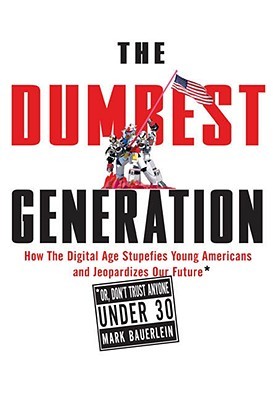

| THE DUMBEST GENERATION How the Digital Age Stupefies Young Americans and Jeopardizes our Future Mark Bauerlein New York: Jeremy P. Tarcher/Penguin, 2008 |
Rating: 5.0 High |
|||
| ISBN-13 978-1-58542-639-3 | ||||
| ISBN-10 1-58542-639-3 | 264pp. | HC | $24.95 | |
This book opens with a chronicle of high-school overachievers caught up in a "competitive frenzy." But this is only a counterpoint, for the true purpose of the book is to examine the mirror image of these intellectual paragons: the growing percentage of American students who don't know facts their parents would consider basic, who lack skills older generations would deem essential. Facts like what protections the First Amendment confers upon American citizens; skills like how to find a foreign country on a map of the world.
Bauerlein, a professor of English at Emory University in Atlanta, has assembled a great deal of evidence to support his case. But that is nothing new; there is a host of studies, reports and books documenting the decline of American students, both in absolute terms and relative to students of other advanced nations.
What makes Bauerlein's work stand out is the passion he brings to the task of understanding and describing this burgeoning deficiency and its effects. That passion comes through clearly. To read his description of "the fiery polemical climate of City College in New York City in the 1930s and 1940s" is to feel his hunger for a revival and expansion of the kind of sharp discourse the intellectuals there conducted among themselves. To read his description of the SDS (Students for a Democratic Society) and their Port Huron Statement is to see that the idealism of 1960s counterculture still has a hold on him. To read his account of ArtShow is to understand his dismay at its acceptance of its students' dismissal of the work of masters like Rembrandt or Picasso, of art history in general.
Citing a blog on USA Today,1 Bauerlein quotes an anonymous 20-something (highlights added):
"Today's young people don't suffer from illiteracy; they just suffer from e-literacy. We can't spell and we don't know synonyms because there's less need to know. What smart person would devote hours to learning words that can be accessed at the click of a button? Spell-check can spell. Shift+F7 produces synonyms. What is wrong with relying on something that is perfectly reliable? (Andrukonis)"
It's not perfectly reliable. Even if writers pay attention to their spell-checkers, many mistakes get by them. Examples are to easy to come buy. Their is know excuse four ignoring the basics of English. Watt due ewe think is the tally of erors caught by a spell-checker inn this paragraph? Exactly won!
Yet a casual inspection by anyone who knows good English quickly reveals ten more. The spell checker won't catch them because they are not misspelled.2 Thus I refute young anonymous. Not knowing the rules of English is unfortunate. Thinking you don't need to know them is unforgivable.
Study of grammar is not merely preparation for pedantry. Success in college and career demands these basic skills.3
And that passion may be the most valuable part of his proposed solution. It is easy to advocate stricter academic standards, or more instruction in the basic skills of spelling, punctuation and arithmetic that are the true bulwarks of professional success. Most every book on education reform does advocate those measures. Just as common is the warning that immersion in the self and the here-and-now dooms our democracy. But to convey the sense that regaining those skills, that historical perspective, that involvement in larger causes than day-to-day survival, is not only necessary but enjoyable — that is a rare thing.
Denigrating the quality of the younger generation has long been a tradition. But study after study documents a real decline in educational attainment, along with a lack of concern in those who show the deficit.
The latest NAEP figures are but another entry in the ongoing catalog of knowledge and skill deficits among the Web's most dedicated partakers. When we look at the front end of digital usage, at the materials and transactions available online, we discover a mega-world of great books, beautiful artworks, historical information, statistical data, intelligent magazines, informative conversations, challenging games, and civic deeds. But when we go to the back end of digital usage, to the minds of those who've spent their formative years online, we draw a contrary conclusion. Whatever their other virtues, these minds know far too little, and they read and write and calculate and reflect way too poorly. However many hours they pass at the screen from age 11 to 25, however many blog comments they compose, intricate games they play, videos they create, personal profiles they craft, and gadgets they master, the transfer doesn't happen. The Web grows, and the young adult mind stalls. – Page 108 |
Bauerlein's excellent book is packed full of results of these studies, and frequently mentions references such as Todd Oppenheimer's The Flickering Mind. It is a thorough discussion of the situation, albeit a somewhat gloomy one. It has an extensive bibliography with 207 entries (books, magazine articles, and Web sites) and a good index. Highly recommended.

 To contact Chris Winter, send email to this address.
To contact Chris Winter, send email to this address.